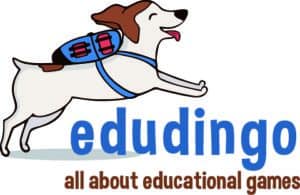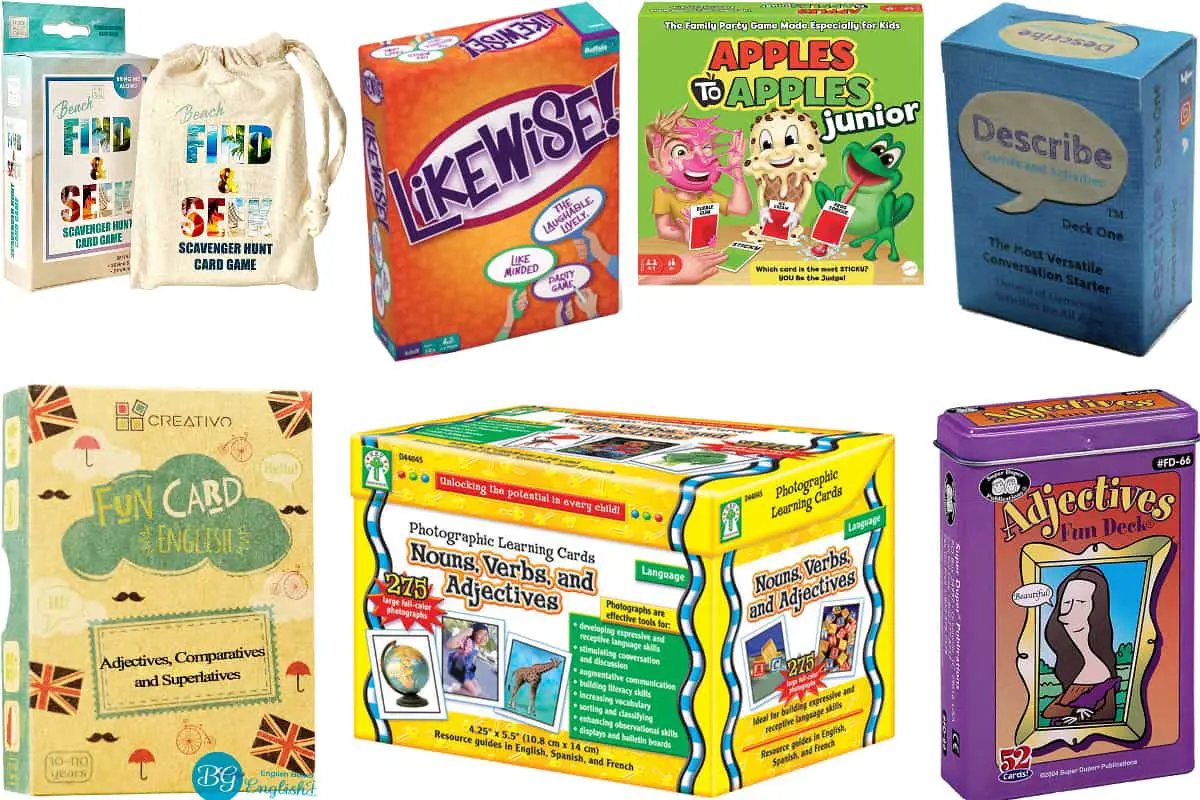This post contains affiliate links.
Kids love adjectives but do not always use them wisely. Here are 9 card games to help them learn and better use adjectives. The list is divided into two categories:
- Card games, like Apples to Apples Jr., where students play with adjective cards
- Flashcards, like Describe, which is primarily used to practice using adjectives in conversations and therapies
Adjectives Card Games and Flash Cards for Elementary
| Game | Age | Price | Players | Rating |
| Apples to Apples Jr. | 6+ | $$ | 4-10 | ★★★☆☆ |
| Find and Seek Scavenger Hunt | 3+ | $$ | 2-6 | ★★★★☆ |
| Fun Card – Adjectives, Comparatives & Superlatives | 8-11 | $ | 2-4 | ★★★☆☆ |
| Likewise! | 10+ | $$$$ | 3-6 | ★★★★☆ |
| Adjectives: ColorCards | 6-9 | $$ | 2-4 | ★★★★☆ |
| Nouns, Verbs, and Adjectives Photographic Learning Cards | 5-8 | $$$ | 1-4 | ★★★☆☆ |
| Adjectives Fun Deck | 6-9 | $$$ | 1-4 | ★★★★☆ |
4 Adjective Card Games for Elementary
Apples to Apples Jr. (Mattel)
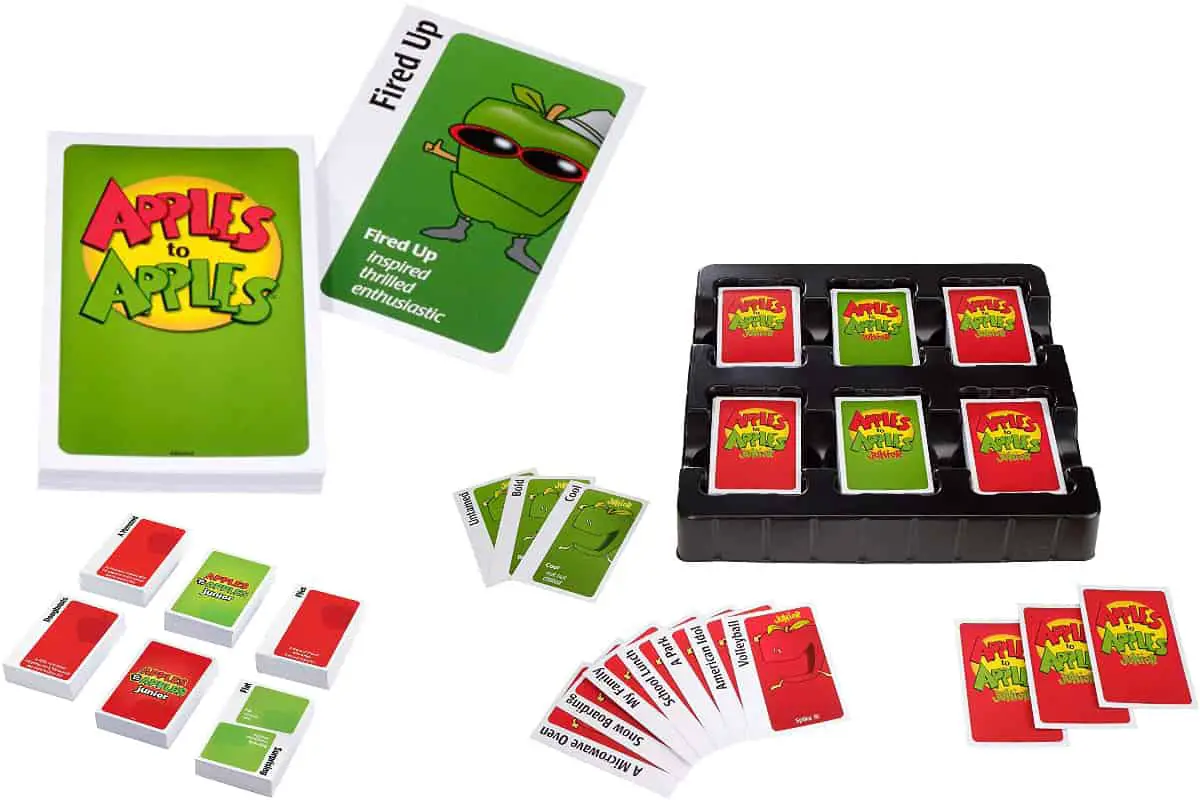
★★★☆☆
For Families and Schools | Age 6+ | 4-10 players | Price $$ | Duration 30-60 min
Apples to Apples Jr. is a classic matching card game featuring silly comparisons between nouns and adjectives.s
is a classic matching card game featuring silly comparisons between nouns and adjectives.s
This rule of the game involves making outrageous associations between red apple (noun) and green apple (adjective) cards. Teachers and parents may change the rules to make this a complement for a lesson in adjectives, for example by making sensible noun/adjective that matches most of the time, and from time to time doing silly ones.
You can start the round with an adult as the judge. The adapted game follows the original rule where the winner of a round becomes the next judge. I like this game because:
- it is easy-to-use
- it can be adapted to becomes super silly or serious for learning
- it widens vocabulary
- it develops learner’s creativity
Each set also comes with 500 cards. This is enough to play several times or to divide the set for several groups of players (at school). There is also an Apples to Apples Party Box set with over a thousand cards for older players (age 12+).
set with over a thousand cards for older players (age 12+).
Find and Seek Scavenger Hunt (Island Genius)
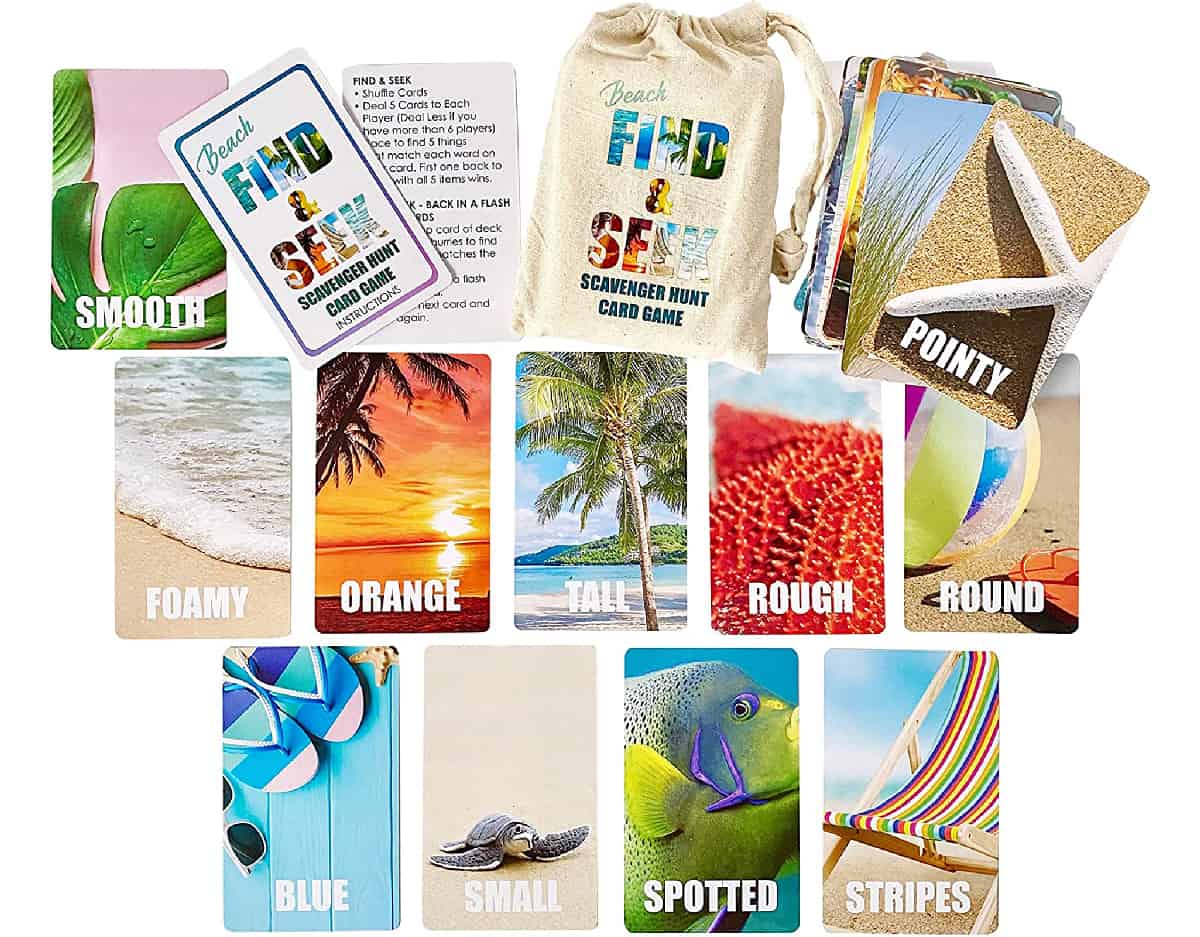
★★★★☆
For Families | Age 3+ | 2-6 players | Price $$ | Duration 20-30 min
Find and Seek Scavenger Hunt I is a 35 labeled picture cards game that enables you to take your child outdoors and use adjectives along the way. There are several ways to play with these cards, for example:
I is a 35 labeled picture cards game that enables you to take your child outdoors and use adjectives along the way. There are several ways to play with these cards, for example:
- Find & Seek – deal cards to the players. Whoever finishes finding objects to match all their cards wins
- Back in a Flash – one player is in in-charge of picking a card and calling it out. Players then race to find an object that matches the adjective
This scavenger hunt card game can be used indoors and outdoors. So, your kids can actually learn how to use the descriptive words in items they see in their everyday lives. I also like this game because:
- it can be used with emergent readers because the pictures help identify the adjectives
- the adjectives used cater to different senses (not visual only)
- the cards can also be used to widen vocabulary and teach how to infer meanings of unfamiliar words
There are only 35 cards but the adjectives can be used almost anywhere, but you can find plenty of objects to match them.
Fun Card English: Adjectives, Comparatives, and Superlatives (Creativo)
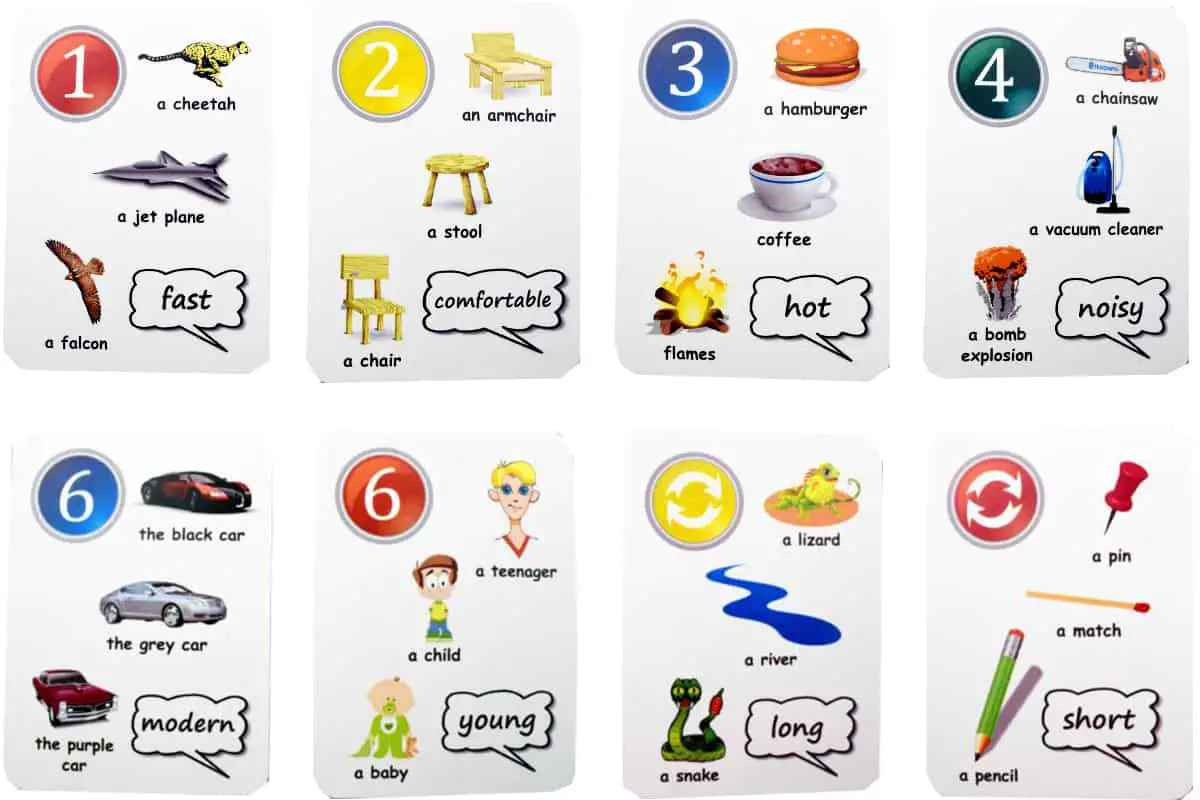
★★★☆☆
For Families | Age 8-11 | 2-4 players | Price $ | Duration 30-45 min
Fun Card English: Adjectives, Comparatives, and Superlative is an adaptation of the UNO card game for teaching descriptive words. Each card features an adjective and three pictures with a corresponding text.
is an adaptation of the UNO card game for teaching descriptive words. Each card features an adjective and three pictures with a corresponding text.
To play a card you need to use the comparative or superlative form of the adjective in a sentence. For example, the card with the word “noisy” and pictures of a chainsaw, vacuum cleaner, and bomb explosion. To use the card, use the details to make a meaningful sentence, like:
- A chainsaw is noisier than a vacuum cleaner.
- A bomb explosion is the noisiest among the three.
The game lets students practice adjectives and sentence building skills. However, some possible sentence combinations are included in the back of each card, making it easy for players to sneak at the key instead of making their own sentences.
Likewise! (Buffalo Games)
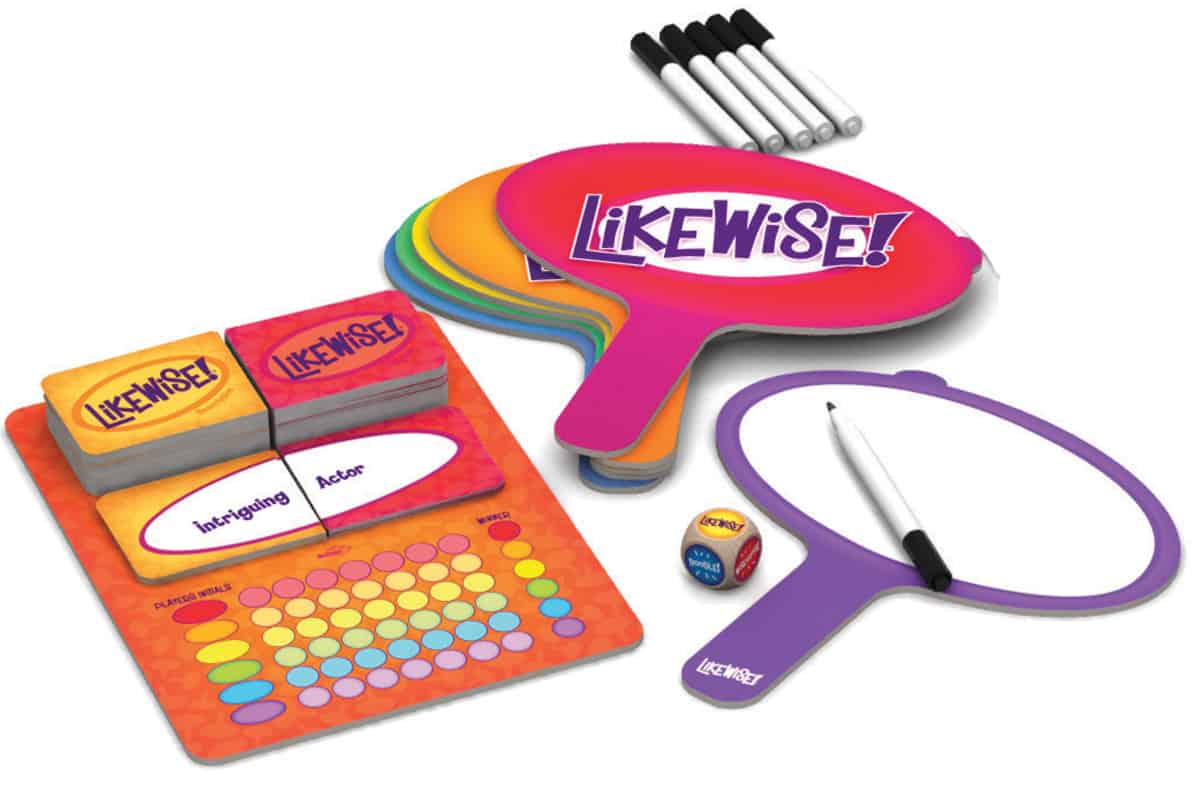
★★★★☆
For Homes and Schools | Age 10+ | 3-6 players | Price $$$$ | Duration 30-45 min
Likewise! is a party card game featuring silly comparisons and over 5,000 categories for teaching adjectives and widening your child’s vocabulary.
is a party card game featuring silly comparisons and over 5,000 categories for teaching adjectives and widening your child’s vocabulary.
This card game includes 71 sets of description and subject cards, 6 paddles and dry erase markers, and a scoreboard. The first to score ten points wins the game. To score, you have to:
- Provide an answer that matches the description
- Match with other players
The answer with the most matches will win each round. But the catch is, each player needs to answer in secret! Besides being a fun way to widen vocabulary and learn more adjectives, I like this game because:
- There are plenty of category combinations, so players will not easily tire out of the game
- It encourages creative and imaginative thinking for silly categories like “mysterious cooking utensil” and “outrageous toy”
You can also use this set to challenge players to use it in a sentence. You can also opt to buy more whiteboards to include more players and even a whole class.
3 Adjective Flash Cards for Elementary
Adjectives: Colorcards (Speechmark Publishing)
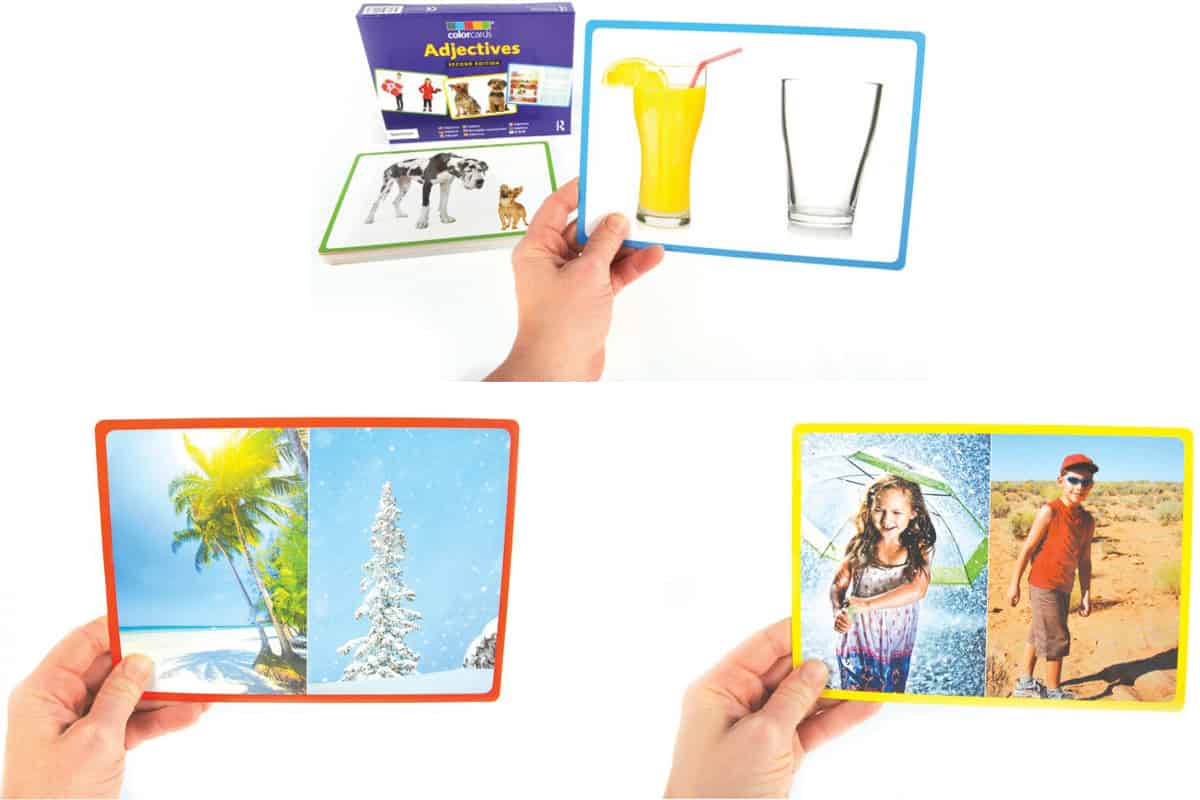
★★★★☆
For Therapies, and Schools | Age 4+ | 2-4 players | Price $$$$ | Duration 20-30 min
Adjectives: Colorcards are 48 adjective flashcards designed by speech and language therapists for English language learning. The set includes pictures of opposite concepts and vocabulary related to everyday experiences. It is a great tool to add to your class or therapy because it:
are 48 adjective flashcards designed by speech and language therapists for English language learning. The set includes pictures of opposite concepts and vocabulary related to everyday experiences. It is a great tool to add to your class or therapy because it:
- Aids in developing pre-language concepts
- Helps with teaching antonyms
- Widens students’ vocabulary
The 48 picture cards are not labeled. They can be used at any age or level, for learning English or other languages. However, it would have been nice to have more cards in the deck.
Nouns, Verbs, and Adjectives Photographic Learning Cards (Key Education Publishing)
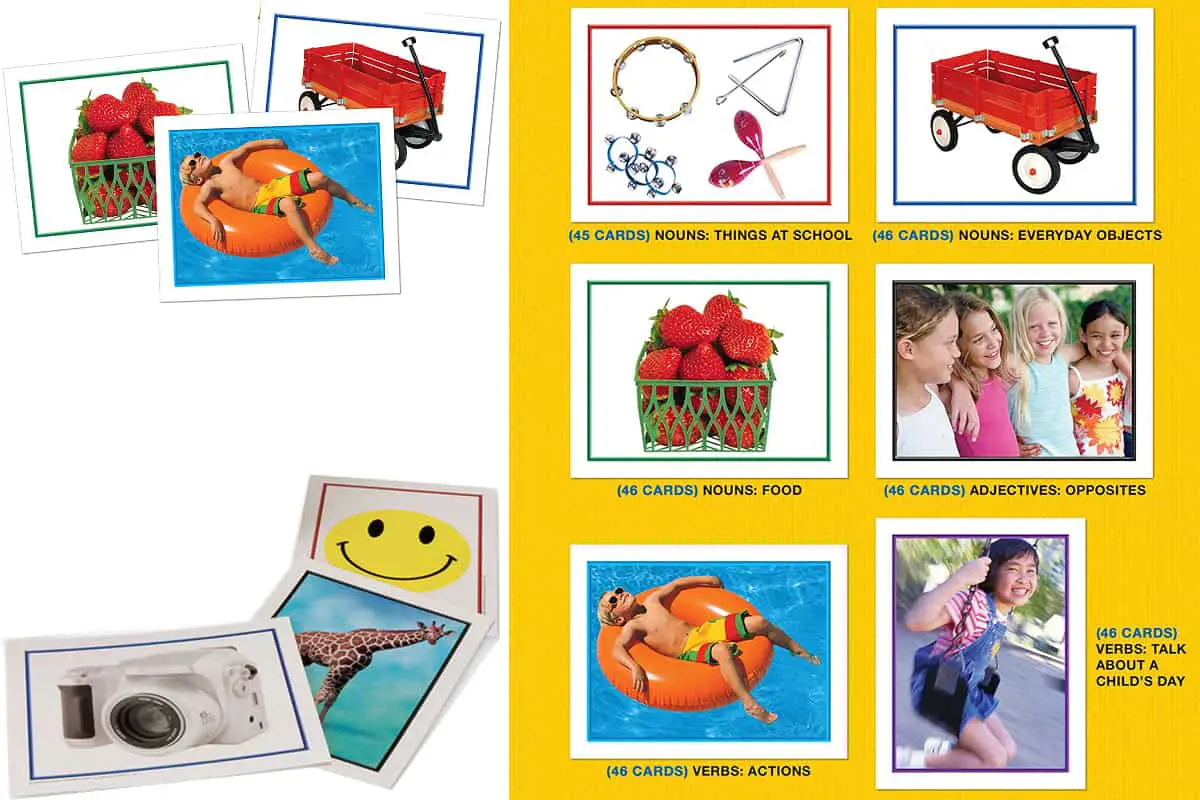
★★★☆☆
For Families, Therapists, and Schools | Age 5-8 | 1-4 players | Price $$$ | Duration 20-30 min
Carson-Dellosa’s Nouns, Verbs, and Adjectives Photographic Learning Cards aim to engage and improve all types of learners – ESL, ELL, and special needs. It covers a vast array of topics related to a child’s everyday life. So, it is relatable and engaging for young children. The nouns, verbs, and adjectives in the cards include:
aim to engage and improve all types of learners – ESL, ELL, and special needs. It covers a vast array of topics related to a child’s everyday life. So, it is relatable and engaging for young children. The nouns, verbs, and adjectives in the cards include:
- everyday objects
- foods
- things at school
- opposites
The 288-photo flashcards are unlabeled. Children will not depend on the names if you’re using them as a sorting game. Each set also comes with a resource guide with French and Spanish translations. However, the adjective flashcards included in the collection only feature 23 opposite pairs. So, while it is helpful as conversation starter flashcards, the set is not a great complement for an adjective lesson.
Adjectives Fun Deck (Super Duper Publications)
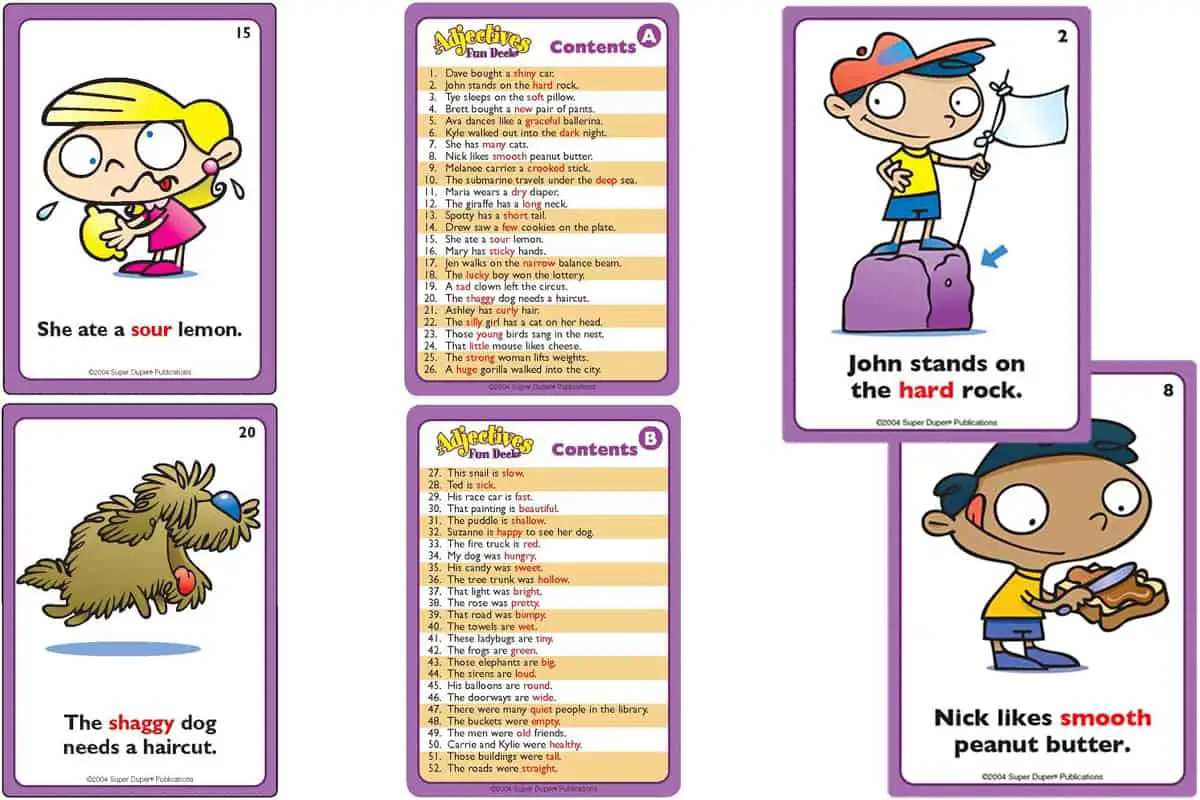
★★★★☆
For Families, Therapists, and Schools | Age 6-9 | 1-4 players | Price $$$ | Duration 20-30 min
Adjectives Fun Deck features 52 illustrated sentences with adjectives that help understand how to use descriptive words in sentences. There are two different ways to include adjectives in sentences – before and after a noun.
features 52 illustrated sentences with adjectives that help understand how to use descriptive words in sentences. There are two different ways to include adjectives in sentences – before and after a noun.
You can use it to teach sentence patterns, conjunctions, and pronouns.
Sentences showcase real-life connections between everyday places and objects, and it uses frequently occurring adjectives, verbs, and nouns.
Other Parts of Speech Board and Card Games for Elementary
If you want to incorporate more games in your elementary English class, you may check out my other posts about the different parts of speech:
- 16 Parts of Speech Board Games for Families and Schools

- 10 Action Verb Board & Card Games for ELA or ESL Classrooms

Using board and card games in class helps break the monotony of pen and paper tasks. It also helps your students develop and practice their skills in a more fun and engaging way!
Edudingo.com is a participant in the Amazon Services LLC Associates Program, an affiliate advertising program designed to provide a means for sites to earn advertising fees by advertising and linking to Amazon.com. We also participate in other affiliate programs which compensate us for referring traffic.
